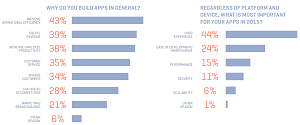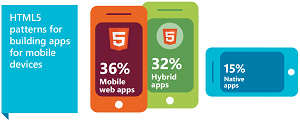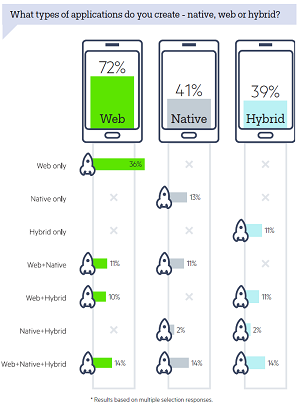News
Survey Shows Devs Slow To Go Mobile
- By David Ramel
- August 25, 2015
Despite all the hype about smartphone apps and enterprise mobility, the latest survey from Telerik shows a surprisingly slow adoption of mobile development.
"The most poignant finding of the survey is that 57 percent of developers have never built a mobile app, indicating that mobile app development remains highly specialized," said Karen Tegan Padir, an exec at Telerik's parent company, Progress Software Corp., in a statement about the survey that was released today.
The Telerik State of Mobile Development survey (available for free download with provided registration info) polled more than 3,000 development-related staffers in June.
In addition to the 57 percent of respondents who reported being brand-new to mobile development, 47 percent said they create an average of just one functional mobile app per year.
"The lack of established best practices for mobile app development and the absence of dominant market leaders have left many developers stuck at the starting line of mobile projects," the survey states.
The listed reasons for the lack of progress in mobile are many, with no overwhelmingly dominant excuse. A primary cause of the slow adoption rate is a lack of time, listed by 19 percent of respondents, followed by changes in technology or development practices (16 percent); lack of development tools to deal with multiple platforms and devices (15 percent); and lack of detailed and updated requirements and specifications (14 percent).
 [Click on image for larger view.]
Why Do You Build Apps and What's Most Important? (source: Telerik)
[Click on image for larger view.]
Why Do You Build Apps and What's Most Important? (source: Telerik)
Another surprise is that the oft-quoted problem of hard-to-find mobile skills was listed behind all those factors, listed by 13 percent of respondents, tied with budgetary constraints and ahead of only information overload (8 percent).
Of those who are doing mobile, improved efficiency is the main driver, listed by 43 percent of respondents, with creating revenue, increasing employee productivity, customer service and customer engagement all grouped closely behind.
The most important element in building apps is the UX, listed by 44 percent of those polled.
Developing clean UIs and developing for multiple platforms were tied as the most daunting challenges to mobile development.
The most-used approach in building apps is hybrid (33 percent), followed by native (25 percent) and Web (19) percent.
"While there are developer frustrations with a lack of available tools and ever-changing development practices, most developers don't have their hearts set on a particular approach for building mobile apps," the survey summarized. "In fact, a significant portion of respondents are indifferent, as long as the end user is satisfied."
However, the Web technology approach coming in at third place behind hybrid and native contrasted with results of similar surveys, including those from Telerik itself. In fact, last year's App Development State of the Union survey reported that "Of those developing for mobile, the majority are focused on Web/HTML5, leaving native and hybrid app development neck-and-neck in terms of adoption." Last year's survey showed 72 percent of respondents used Web technologies (sometimes in combination with other approaches), followed by native (41 percent) and hybrid (39 percent). That's an exact reversal of this year's survey results, though different audiences were polled with different questions.
Going back even further, a Global Developer Survey published in 2013 by Kendo UI, a division of Telerik, found that "Of the 5,000 survey respondents, 36 percent noted that they'd use pure HTML5 (browser) implementations for cross-platform development, followed closely by hybrid initiatives (32 percent). A mere 15 percent would leverage pure native development."
Although not apple-to-apple comparisons, here's how the three surveys depicted the hybrid/native/Web questions:
 [Click on image for larger view.]
2013 Survey (source: Telerik)
[Click on image for larger view.]
2013 Survey (source: Telerik)
 [Click on image for larger view.]
2014 Survey (source: Telerik)
[Click on image for larger view.]
2014 Survey (source: Telerik)
 [Click on image for larger view.]
2015 Survey (source: Telerik)
[Click on image for larger view.]
2015 Survey (source: Telerik)
About the Author
David Ramel is an editor and writer at Converge 360.